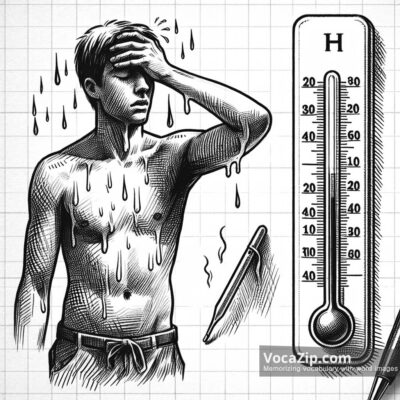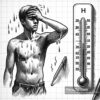fever meaning
fever :
a high body temperature, a symptom of illness
noun
▪ He has a fever and needs to rest.
▪ He has a high body temperature and needs to rest.
▪ She took medicine to reduce her fever.
▪ She took medicine to lower her body temperature.
paraphrasing
▪ temperature – high body temperature
▪ pyrexia – high body temperature
▪ chills – shaking due to illness
▪ malaise – feeling unwell

Pronunciation
fever [ˈfiː.vər]
The stress is on the first syllable 'fee' and sounds like 'fee-ver'.
Common phrases and grammar about fever
fever - Common meaning
noun
a high body temperature, a symptom of illness
Part of Speech Changes for "fever"
▪ febrile (adjective) – having or showing the symptoms of a fever
▪ feverish (adjective) – showing signs of a fever, or being very excited
▪ febrility (noun) – the state of having a fever or being prone to it
▪ febrifuge (noun) – something that reduces fever
Common Expressions with "fever"
▪ have a fever – to be sick with a high body temperature
▪ high fever – an abnormally high body temperature
▪ catch a fever – to become ill with a fever
▪ low-grade fever – a mild increase in body temperature
Important examples of fever in TOEIC
Vocabulary examples from the TOEIC test
In TOEIC vocabulary questions, fever is used to describe a high body temperature due to illness.
Example of a confusing word: fervor (intense passion)
Grammar examples from the TOEIC test
Fever is a countable noun and is often used with 'a' or 'have'.
fever
Idioms and fixed expressions in TOEIC
run a fever
to have a high body temperature
fever pitch
a state of intense excitement
Differences between similar words and fever
fever
,
temperature
differences
Fever refers to a high body temperature due to illness, while temperature is the measurement of heat in the body.
fever
,
illness
differences
Fever is a specific symptom of illness, while illness refers to the general state of being unwell.
Words with the same origin as fever
The origin of fever
The word 'fever' comes from Old English 'fefor', related to the Proto-Germanic '*fiebrą'.
Word structure
The composition of the word 'fever' is unclear.
Words with the same origin
The root of 'fever' is 'fefor', meaning 'fever'. Words with the same root include 'febrile' – showing signs of a fever and 'febrifuge' – something that reduces fever.
Please select an image in the quiz
Previous post and next post







